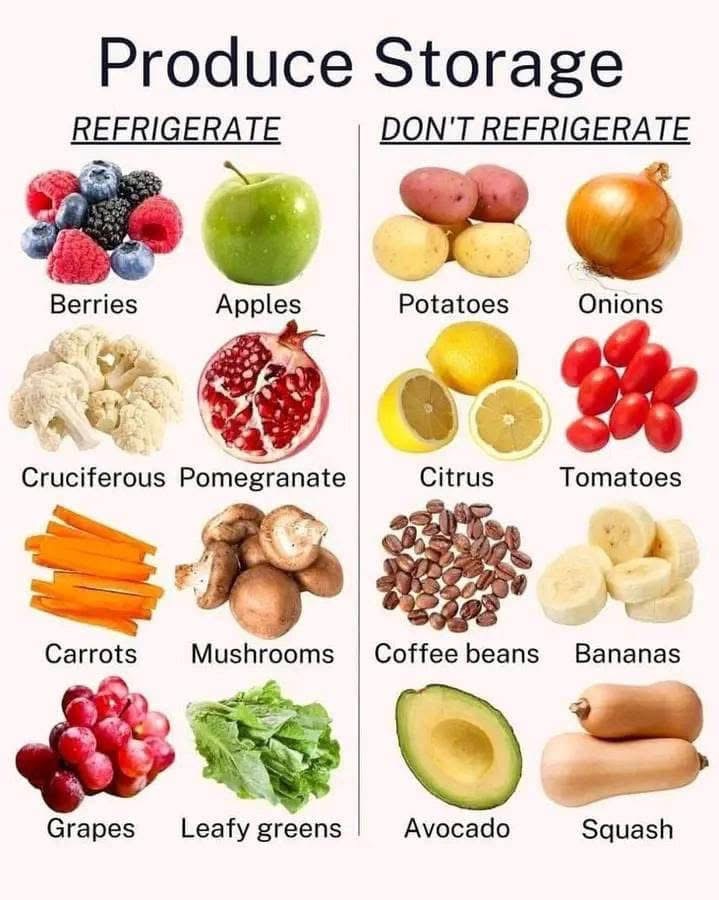Ultimate Guide to Freshness Hacks for Your Kitchen: Keep Your Produce Crisp and Delicious
If you’ve ever opened your fridge to find wilted greens or mushy berries, you know the frustration of wasted food. Learning how to store your produce properly can save you money, reduce food waste, and keep your meals fresh and flavorful. With just a few simple hacks, you can maximize the shelf life of your fruits and vegetables while maintaining their nutrients and taste.
In this guide, we’ll cover everything you need to know about keeping your produce fresh, from what should go in the fridge to what thrives at room temperature.
Why Proper Storage Matters
1. Reduces Food Waste: In the U.S. alone, millions of pounds of produce are wasted each year. Proper storage helps cut down on this waste.
2. Saves Money: Keeping your fruits and vegetables fresh longer means fewer trips to the store and less money spent replacing spoiled items.
3. Preserves Nutrients: Fresh produce retains its vitamins and minerals longer when stored correctly.
4. Enhances Flavor: Proper storage ensures your food tastes as good as it should when it’s time to eat.
What to Refrigerate 🥶
Certain fruits and vegetables thrive in the cool, humid environment of the fridge. Here’s a list of produce that should always be refrigerated:
• Berries (Strawberries, Blueberries, Raspberries): Store in a breathable container lined with paper towels to absorb moisture. Wash just before eating.
• Apples: Keep them in the crisper drawer to maintain their crisp texture for weeks.
• Carrots: Place them in a sealed bag or container with a damp paper towel to prevent drying out.
• Leafy Greens (Spinach, Kale, Lettuce): Store in a perforated bag or container with a dry paper towel to absorb excess moisture.
• Cruciferous Vegetables (Broccoli, Cauliflower, Brussels Sprouts): Wrap in a paper towel and place in the crisper drawer for optimal freshness.
What NOT to Refrigerate 🌡️
Some fruits and vegetables don’t fare well in the fridge. Cold temperatures can alter their texture, flavor, or ripening process. Store these items at room temperature instead:
• Potatoes: Keep in a cool, dark place like a pantry to prevent sprouting. Refrigeration can make them gritty and overly sweet.
• Onions: Store in a well-ventilated area away from direct sunlight to keep them firm and flavorful. Avoid storing near potatoes to prevent sprouting.
• Bananas: Allow them to ripen on the counter. If they start to over-ripen, peel and freeze them for smoothies or baking.
• Avocados: Let them ripen at room temperature. Once ripe, you can refrigerate them for up to a few days to slow the ripening process.
Bonus Tips for Keeping Produce Fresh
1. Keep Ethylene Producers Away: Fruits like apples, bananas, and avocados release ethylene gas, which can speed up ripening. Store them separately from ethylene-sensitive produce like leafy greens and berries.
2. Invest in Storage Solutions: Use breathable produce bags, reusable containers, and silicone food savers to keep your fruits and vegetables fresher for longer.
3. Dry is Key: Moisture can cause produce to spoil quickly. Always dry your fruits and vegetables before storing them.
4. Wash Later: Washing fruits and vegetables before storing can introduce moisture that speeds up spoilage. Only wash produce right before you use it.
5. Check Regularly: Remove spoiled items immediately to prevent them from affecting the rest of your produce.
Special Hacks for Popular Produce
• Herbs (Cilantro, Parsley): Trim the ends and place the stems in a jar of water, like a bouquet. Cover loosely with a plastic bag and refrigerate.
• Citrus Fruits (Oranges, Lemons, Limes): Store in the fridge to keep them juicy for weeks, or leave them on the counter if you’ll use them within a week.
• Tomatoes: Store at room temperature for the best flavor. Refrigerate only if they’re fully ripe and you need to extend their shelf life.
Benefits of Proper Storage
By following these simple freshness hacks, you’ll notice a significant improvement in how long your produce lasts and how great it tastes. You’ll also find it easier to plan meals and snacks because your ingredients are always in prime condition.
FAQs About Produce Storage
Q: Can I store fruits and vegetables together?
A: It depends. Ethylene-producing fruits like apples and bananas should be kept away from sensitive items like leafy greens and cucumbers to prevent spoilage.
Q: How can I revive wilted greens?
A: Soak them in ice water for 10-15 minutes. They’ll perk up and regain their crispness.
Q: What’s the best way to store fresh berries?
A: Keep them dry in a breathable container lined with paper towels. Wash just before eating.
Start Storing Smarter Today!
Proper produce storage is a game-changer for anyone who loves cooking and eating fresh, flavorful meals. With these easy hacks, you can extend the life of your fruits and vegetables, reduce waste, and make the most of your grocery budget.
What’s your favorite freshness hack? Share your tips and tricks in the comments below! Don’t forget to bookmark this guide and share it with your friends—because everyone deserves fresher food.
